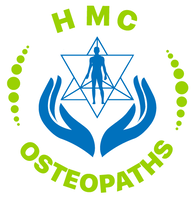|
By Kirby Edwards Hi HMC team! Recently I have been having a few discussions about anxiety and stress. So, I thought I would share some of my tools that I have in my tool kit. Please note, I am not a psychologist, doctor, counsellor, or psychiatrist. This is my ever-growing tool kit (and am open to more suggestions, the more tools the better!) If you feel like you need a little extra help, there are resources available including counsellors, psychologist, psychiatrists, lifeline, beyond blue and your GP. Your GP is the best avenue to pursue counsellors, psychologists and psychiatrists. And Lifeline and Beyond Blue are fully staffed with 24-hour hotlines So what is Anxiety..? Anxiety is our body’s way to alert us to danger. Short term it is a good thing because the body releases hormones that stimulate our sympathetic nervous system (fight or flight) and helps us to react to fearful or stressful situations quickly. Short term this is amazing! Long term, it is not ideal. Anxiety is a unique experience and can feel different for everyone. Some people may not have ever experienced it and some people may experience it but not know what it is. Be kind, you never know what someone is going through on the inside. While there are different types of anxiety and it is very individual, beyond blue talks about some common signs and symptoms including:
Here are some tools that may help you if you are experiencing any of the symptoms of anxiety: Breathe Breathing is your best friend, and a necessity. We know that our body is so clever that we can breathe without thinking, but when was the last time you took a conscious breath? Sometimes we forget to breathe or might find yourself even holding it. Let it go… a nice slow exhale. A deep breathe in and doubling your exhale stimulates your vagus nerve, which is a branch of your parasympathetic nervous system also known as our ‘rest and digest’ state. This will help to steer you away from the elevated ‘fight or flight’ mode (the sympathetic nervous system) that we are in when we are stressed/anxious. Check out other HMC blogs for more information on the benefits of breathing. There is also a great book called “Breathe” by James Nestor that has lots of great info. 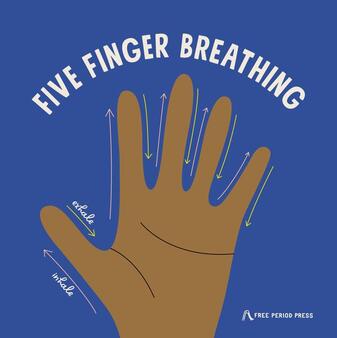 Hand/finger Breathing A great one for kids and adults alike. Hold up one hand in, stretching the fingers out. We are going to trace our fingers with our other pointer finger. Start at the thumb and trace it slowly from the bottom to the top of the thumb as you BREATHE IN, when you get to the top, trace the thumb slow down as you BREATHE OUT. Repeat this all the way along the fingers – repeat on the other hand if you need to. Journaling Either writing or use your voice memos on your phone. Sometimes we just need to get our thoughts out of our head to remind us you are not your thoughts, it is feelings, and what you feel is valid, but feelings will pass. Feel Good List When you are feeling good, write down a list of things that you enjoy or that make you feel good, then when you’re not feeling great you can look at the list and pick something… For some of us at HMC it’s nature, surfing, yoga, breathing, nature, music, swimming or hugging our kids/grandkids or a tree… 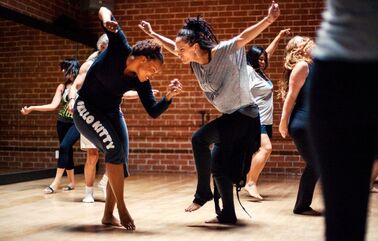 Move Movement or exercise can help you get out of your head… it releases good endorphins which can help shift your mood. The benefits of exercise/movement are epic. I say move because it doesn’t matter what you do, just start. Research has shown 10 minutes a day is helpful to shift your mood. That’s 3 songs if you like dancing, about 1 kilometre of walking, sweeping and mopping the floor (or half of it if you have big house), parking a bit further away to walk to the shops. Get creative but get moving. Try it! Sometimes I like to walk and talk into my voice memos, there is a feeling of moving forward from whatever is going on at that time for me. Sleep Taking care of your physical health supports your mental health as well. Due to the many aspects of sleep and anxiety, getting better sleep may help combat feelings of anxiety. Examples of possible changes include, building healthier sleep habits/hygiene, limiting stimulants such as caffeine and alcohol, relaxation techniques or breathing. Previous blogs on our HMC site include information the importance of sleep and sleep hygiene/routine and boosting our immune systems. The implementation of these small but powerful habits can have a big impact on how your body/mind responds to stressful situations. Diet Research has been shown that a healthy diet can assist with anxiety. A poor diet, which consists of foods with high sugar, salt and fat content, highly processed and low nutritional value, could lead to an increased risk of experiencing anxiety (amongst other things). Eating a balanced diet including fresh fruit, vegetables, whole grains, limited fat dairy, lean poultry and meant, legumes, seafood, nuts and delicious healthy oils can help to minimise anxiety. 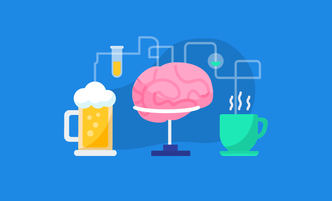 Alcohol and Caffeine These guys get their own tab. Alcohol is a depressant and caffeine has a half-life of 3-7 hours and as a result may make it difficult to sleep if consumed too late. I generally cannot have full caffeinated coffee after 11.30am to 12 noon. Due to the characteristics of alcohol and caffeine, they can aggravate anxiety or trigger panic attacks in certain people. Limit the intake, switch to decaf or try some alcohol-free or low alcohol options as an alternative. 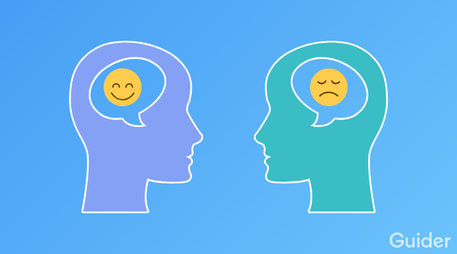 Self-talk or Observing your Thoughts Negative self-talk can be a challenging cycle to break or shift to a more positive self-talk. One way to do it is to think of what you might say to a child or to a dear friend that is having a hard time. Also, a reframing of the language can help to shift your perspective to understand that is not going to be forever. For example, instead of “I have anxiety, it’s just the way it is” we could try “I am experiencing some anxiety at the moment, it will pass. I will breathe and look for some tools to manage it.” Or instead of “I should not feel like this” try “I am learning how to manage this”. If this is interesting to you, it might be worth looking for a counsellor/psychologist etc, that works with Cognitive behavioural therapy (CBT) or Acceptance and Commitment therapy (ACT). By observing your thoughts, you can start to correlate triggers or patterns. This can be helpful to mitigate anxiety. For example, if I know I have a stressful situation coming up, I exercise beforehand. Over the years of trial and error, I have found that by exercising beforehand, I have a better handle on the situation, and I am more likely to respond, rather than react. Another question to ask yourself is “is it mine?”. We can sometimes find ourselves getting caught up in other people’s emotions/stresses etc. This is a very compassionate and empathetic way to be, however, is it really necessary to carry other people’s anxiety/stress around as well? This self-questioning is NOT a blame game, this is just a reminder to take a moment, a deep breathe and ask if this emotion is yours, if it is not than it is ok to let it go. If it is yours, then breathe again. Supplements that can support Some handy ones I keep in my handbag include - Emergency Bushflower essence, bach flower or rescue remedy drops, ashwagandha tablets, lavender oil. You should always speak to your doctor or health professional before starting on supplements as they may interact with certain medications and may be toxic to the body in large quantities and/or may not be suitable for you for various reasons.  Take some time for you You cannot pour from an empty cup, so what fills up your cup? Is it the soul nourishing humans you need to make a call to or is it that walk around the block that you missed to keep you grounded. Refer to your list of “feel goods” if you need to. Communicate with your family, friends, and your Team Reach out if you need to, chances are you know someone else who has also experienced anxiety to some level. One of the phrases I use is “Hi friend. I am currently experiencing some anxiety, could you please listen to me, I do/don’t need someone to solve my problem right now, I need someone to listen.” This statement may rustle a few feathers at first but the direct way of communicating means that person is aware of what you need right now in your current situation. There is no guessing. Not everyone has experienced anxiety and as it is such a unique experience, some people don’t know how to help when you reach out. If you are reaching out to them, it is likely they love you and will want to help. Try not to be shy about what you need at that time. Counting Sometimes counting can be helpful. Counting to 10 while taking some deep breathes can sometimes be a quick change from reactive to responsive. 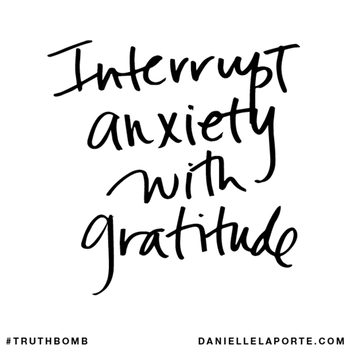 Gratitude Benefits of gratitude include enhancing mood, positive emotions and thoughts, better communication, improved physical health (including sleep) and more! This research has found that our brain releases dopamine and serotonin, which are two feel ‘good’ neurotransmitters when we express gratitude. In some studies, it has also shown to reduce pain and release toxic emotions. Sometimes I forget this, so for me to be accountable, I recruit a friend, at the end of each day we text each other 3 things we are grateful for… Eg. “Hi friend, today I am grateful for fresh water, friends and my dog”. I have some friends that do it with their children at the end of the day. Meditation Even just 5 minutes a day can make a difference – take that 5 minute of your screen/scrolling time and meditate instead… My favourite is ‘yoga nidra’ on you tube. A previous HMC blog is about Progressive Muscle Relaxation, which is also a goodie! 3-3-3 rule Look around you and name three things you can see, three things you can hear, three things you can feel. Also do a quick body scan and unclench anything that is clenched. Some common ones are your shoulders, jaw, pelvic floor or hands… Stay hydrated! If we are not hydrated enough, it can lead to restlessness, poor concentration, low energy and agitation.  Superman Power Pose Ok, this one is a bit far out but try it, do it on your own if you like but this pose – standing with your feet hip distance apart, hands on hips, chest out and eyes forward or slightly looking up – can help shift your mood. Podcasts There are a lot of good podcasts out there, take it all with a grain of salt and trial a few to see if they help. Some of my favs include the Huberman Lab, the Mindset Mentor, Ted talks, anything by Brene Brown, oh also sometimes you just need to laugh – so throw a funny one on and laugh until you feel lighter! How can osteopathy help? The mind-body connection is undeniable. Even for people who don’t experience anxiety, even just listen to your body when you are nervous about something or excited? Butterflies? Sweaty palms? Increase in heart rate? That’s your body responding to your mind. Some of the principles of osteopathy include:
With regards to anxiety, Osteopathy can help with working on:
Some previous blogs have some information that may be helpful including a progressive muscle relaxation, breathing, sleep and the lymphatic system… oh who am I kidding, they are all GREAT reads ☺ Remember you are worthy, you are not your thoughts and it will pass. You can only control what you can control, try not to spend too much (if any) time in the what ifs, and more time in gratitude. You don’t have to stay in this state of anxiety, it is often treatable. It is just a matter of exploring the best fit for you. Some of these lifestyle changes listed here may be enough to help. Or you may need to seek more help from the below resources or your GP or a counsellor. There is help available. Take care and be kind to yourself (and each other). Cheers Kirby ☺ Resources https://www.blackdoginstitute.org.au/resources-support/anxiety/ https://www.beyondblue.org.au/the-facts/anxiety/signs-and-symptoms https://www.lifeline.org.au/get-help/information-and-support/anxiety/ References and further resources below: https://www.hmcosteopaths.com/blogs http://www.thecalmcorner.com/2018/11/material-share-monday-5-finger-breathing.html https://positivepsychology.com/neuroscience-of-gratitude/ https://www.facebook.com/totalbalancehealth/photos/happiness-chemicalsim-sure-you-have-heard-about-all-these-different-chemical-com/3301269156585465/ https://dietitiansaustralia.org.au/wp-content/uploads/2016/07/NR06_pg014-anxiety-Tania-Matthewson.pdf https://www.sarahwilson.com/2017/01/interrupt-anxiety-with-gratitude/ https://www.sleepfoundation.org/mental-health/anxiety-and-sleep https://blog.ted.com/10-examples-of-how-power-posing-can-work-to-boost-your-confidence/
0 Comments
By Angus Nichol Over the past couple of years, it has been impossible to escape the all-encompassing pandemic we’re currently living through. There has been a lot of emphasis placed in the media about the importance of vaccination to protect us against coronavirus, but there has been limited information given about how we can support our body’s immune system to give us the best chance of fighting it off… well, any type of infection. This may be particularly important as restrictions start easing and the promise of national and international travel (for people and the viruses they carry) becomes more realistic. The lymphatic system can be thought of as the body’s “sewerage system”, and it plays an important role in enhancing and facilitating the function of the immune system, as well as other important roles in maintaining fluid balance and aiding the absorption of dietary fats for metabolism and storage. However, this blog will focus on the lymphatics system role in immunity, how osteopaths and other health professionals can support your lymphatic and immune health, and other ways that you can keep your lymphatic (and immune) system strong enough to fight off whatever potential invaders life throws at us! So… what is the lymphatic system? The lymphatic system is a division of the body’s circulatory system that is separate, but also closely related to the vascular system. It consists of a network of lymphatic vessels and nodes, as well as various organs that have specialised functions. The lymphatic system helps protect the body against infection by producing white blood cells called lymphocytes, which help the body fight off disease-causing microorganisms. The organs and tissues of the lymphatic system serve as major sites of production, differentiation, and proliferation of two types of lymphocytes—the T lymphocytes and B lymphocytes (aka T and B cells). Although lymphocytes are distributed throughout the body, it is within the lymphatic system that they are most likely to encounter foreign microorganisms. Here are some of the major components: 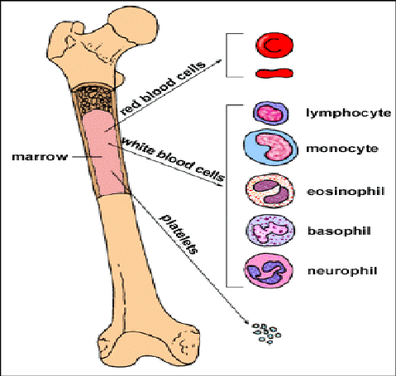 Bone marrow - The bone marrow it’s the soft, squishy substance inside the hard outer casing of the bone. All lymphocytes derive from stem cells in the bone marrow. Stem cells destined to become B lymphocytes remain in the bone marrow as they mature, while prospective T cells migrate to the thymus to undergo further growth. 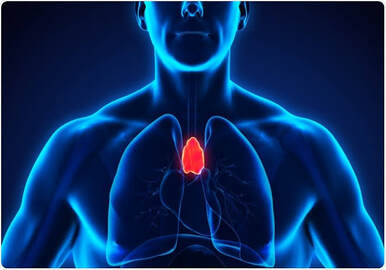 Thymus - Your thymus sits in the upper part of your chest ,just behind your sternum and in front of the heart. This is where T lymphocytes (T cells) proliferate, differentiate and mature. 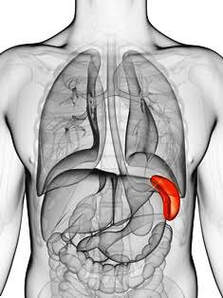 Spleen - The spleen sits behind your lower ribs on the left side. One of it’s main functions is that it acts as an interface between the vascular and lymphatic system, bringing blood into contact with lymphocytes. Both blood and lymph (lymphatic fluid) contain specialised cells that aim to identify, destroy and remove disease-causing microorganisms. 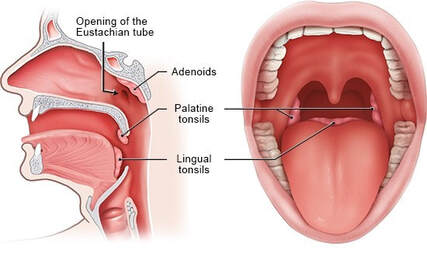 Tonsils - Humans have three sets of tonsils. The tonsils at the back of our throat that we think of are known as palatine tonsils, however we also have adenoids and lingual tonsils. These act as security guards to ward off any nasty foreign intruders trying to enter the body through the mouth and nose. They also contain B and T cells used to fight infection. 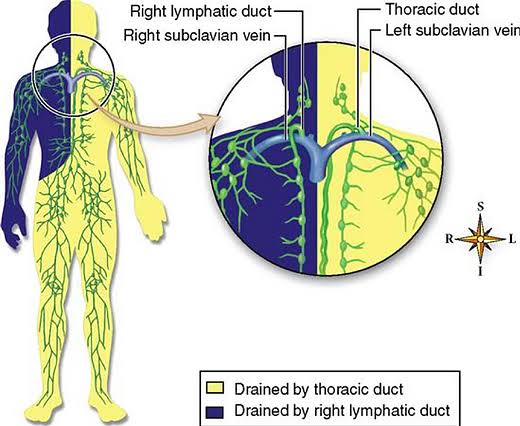 Lymph nodes - The lymph nodes, or lymph glands, are small, encapsulated bean-shaped structures composed of lymphatic tissue. Thousands of lymph nodes are found throughout the body along the lymphatic routes, and they are especially prevalent in areas around the armpits (axillary nodes), groin (inguinal nodes), neck (cervical nodes), and knees (popliteal nodes). Lymphatic vessels - The lymphatic vessels connect all the lymphatic organs to form the plumbing or sewerage network in your body. They transport fluid away from tissues and are similar to blood vessels, but they don't carry blood. The fluid transported by lymphatic vessels is called lymph. Lymph is a clear fluid that comes from blood plasma that exits blood vessels at capillary beds.This fluid becomes the interstitial fluid that surrounds cells. Lymph vessels collect and filter this fluid before directing it toward blood vessels near the heart. It is here that lymph re-enters blood circulation. Lymphatic vessels from various regions of the body merge to form larger vessels called lymphatic trunks. The major lymphatic trunks are the jugular, subclavian, bronchomediastinal, lumbar, and intestinal trunks. Each trunk is named for the region in which they drain lymph. Lymphatic trunks merge to form two larger lymphatic ducts. 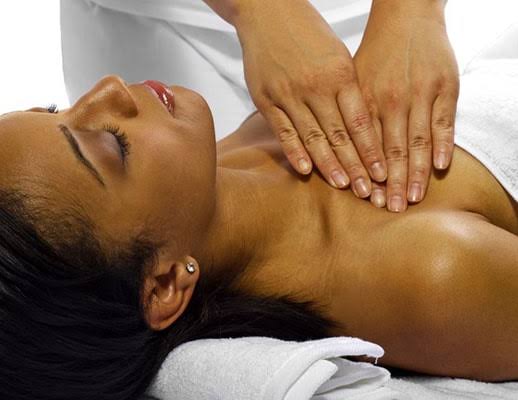 How can your Osteopath help? So, now we know what the lymphatic system is and how it works… but how can your local osteopath treat the lymphatic system, and aid your immune system? I’m glad you asked. Two of the main principles of osteopathy is that structure governs function, and that the body works as a unit. Lymphatic vessels may be squished by overlying musculoskeletal structures such as tight muscles and fascia (connective tissue), much like standing on or running over a garden hose. Furthermore, stiff joints may may cause kinks in these internal hoses and reduce our mobility, thus restricting the flow of lymph through our sewerage system. Osteopaths can assess where there might be be lymphatic blockages present. We can then use a variety of soft tissue/massage, joint articulation and other movement based techniques to relieve the pressure on lymphatic vessels and clear the blockages in our plumbing system. This will encourage the free flow of lymphatic fluid, thus increasing the circulation of all those disease-fighting cells around the body. Furthermore, osteopaths may also manipulate the connective tissues surrounding organs (for example, the spleen or tonsils) to encourage optimal function of these organs. Pretty cool, huh? But guess what… there’s plenty of other health professionals who can help in treating the lymphatic and immune systems. GPs are the gatekeepers of serious disease, and they may prescribe you with medications or send you off to a specialist specific to your immune condition. Naturopaths, Traditional Chinese Medicine (TCM), Acupuncture and Kinesiologists can be invaluable alternative therapies that may help you to assess vitamin/nutrient deficiencies and prescribe natural alternatives to pharmaceuticals and/or supplements to help boost your immune system for prevention and treatment of immune conditions. Even though there are plenty of professionals out there who can help, in the end it’s YOUR body and YOUR immune system… and guess what, there are some simple and effective ways to optimise your own immune and lymphatic health. Vaccination isn’t the only way to fight disease. Let's start with the simple things that you may already be practicing in your everyday routine...
This seems like a lot, but each thing you do has an additive effect in enhancing your immune system health and overall wellbeing. So, start with something small and try to make it a habit, and then add more good habits over time! 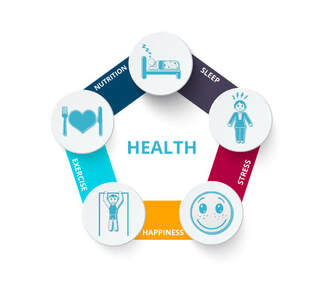 Do you want to know a few more specific ways to promote your lymphatic function…? I got you! Swimming, yoga, dancing and trampoline all use gentle (and sometimes less gentle) full body movements that can help release tension in your muscles and fascia, improve joint mobility and encourage lymphatic flow through your body. Furthermore, regular breathwork (see my previous breathwork blog for beginners) can help the body’s primary pump (well… maybe after the heart) to get you up and moving. Furthermore, there are a wide variety of supplements that are available to help support the immune system. You should always speak to your doctor or health professional before starting on supplements as they may interact with certain medications, can be toxic to the body in large quantities and/or may not be suitable for you for various reasons. Here, I will focus on three supplements which may help support the body’s immune response to coronavirus. Vitamin C - An antioxidant and free radical scavenger that has anti-inflammatory properties, helps strengthen blood vessels and influences cellular immunity that may help to protect against infection. Good dietary sources of Vit C include broccoli, capsicum, potatoes, tomatoes, citrus fruits and many more! Vitamin D - Vitamin D has been theorised to be a protective against coronavirus. One study found that regular Vit D supplementation was associated with 34% less chance of COVID-19 infection. Sun exposure helps your body to naturally create Vitamin D, so spend a bit of time (but not too much) soaking up some rays. Zinc - Zinc may help prevent COVID-19 from entering the body through three complex mechanisms; it may also directly prevent the ability of the virus to replicate; and also helps to balance out the immune system’s reaction to coronavirus. So, whether you’re trying to avoid COVID-19 infection, trying to prevent side-effects after vaccination or boosters, or just want to support you general well-being… visit your local osteopath or other healthcare practitioner and ask how they can help you to support your own immune and lymphatic systems! Stay healthy and stay happy! |
HMC TEAMIf you find something of interest that might suit this space, or would like information on a specific topic, let us know at [email protected]
Archives
December 2023
Categories |
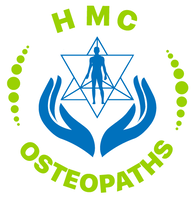
 RSS Feed
RSS Feed
